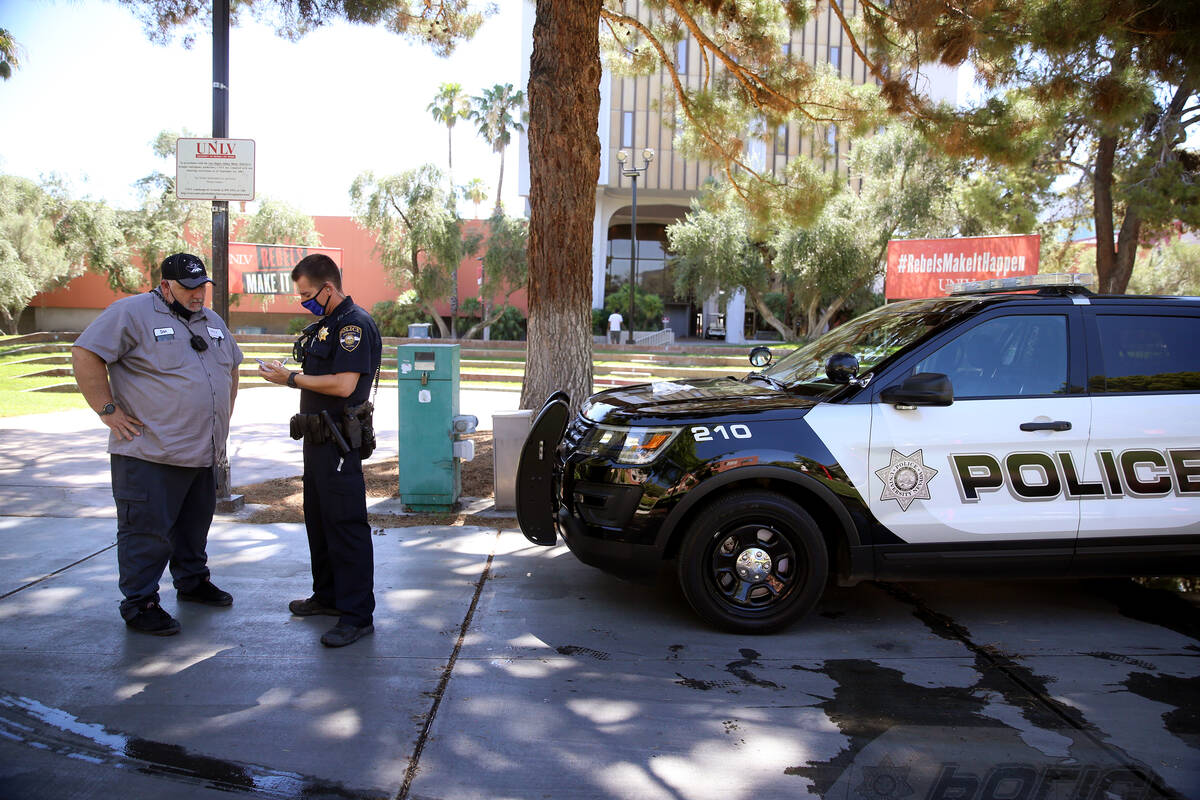University police seek ‘critical labor shortage’ designation
The law enforcement agency that serves Nevada’s public college and university campuses plans to ask for a “critical labor shortage” designation.
University Police Services is bringing the request to a Thursday meeting of the Board of Regents at Great Basin College in Elko. The meeting also will be streamed live online.
As of mid-August, there were 38 vacant positions for sworn law enforcement and dispatch — 32 in the southern command that covers the Las Vegas area and six in the northern command. That’s a vacancy rate of about 35 percent.
“What we’re basically doing is treading water,” said Adam Garcia, vice president of public safety services and director of University Police Services’ southern command.
University Police Services is competing for candidates from the same pool as other agencies that have higher starting salaries and better benefits, according to online meeting materials.
Since January 2019, 59 employees have retired or resigned.
Recruiting happens year-round for law enforcement and dispatch positions, with between 250 and 500 applicants annually, according to meeting materials. But since 2019, those have only produced about 35 new hires.
The worker shortage creates “liability and safety concerns for our campuses and officers,” according to meeting materials posted online, and affects employees’ wellbeing and morale because of an increased workload and overtime hours.
But Garcia told the Las Vegas Review-Journal on Thursday that staffing shortages don’t have an effect on safety.
“We’re not at a critical point at all,” he said.
Garcia said the designation would allow police to provide the quality of services needed on college and university campuses, and to do other important work such as traffic enforcement, student and faculty outreach, and homeless outreach.
The “critical labor shortage” provision under state law would allow University Police Services to specify certain positions as experiencing a shortage for up to two years.
It also would allow the agency to “immediately onboard and integrate trained personnel into campus patrols,” meeting materials state.
In addition, the designation would allow the department to “expeditiously rehire retired law enforcement and public safety positions, without impacting their retirement benefits,” according to meeting materials.
Garcia said he doesn’t have a sense of how many retired employees would be willing to come back.
But in law enforcement and public safety, employees can retire at a fairly young age — often, in their 50s — and many times, they are still eager to work in their chosen profession, and “this is a huge opportunity,” he said.
Given the small size of University Police Services, even filling five to 10 positions would be a “godsend,” Garcia said.
The department isn’t unique in experiencing challenges with recruiting and retaining employees, he said, noting it’s an issue with law enforcement agencies across the country.
That’s due to factors such as the COVID-19 pandemic, as well as “societal scrutiny” and “heightened law enforcement accountability,” meeting materials state.
Garcia said he thinks University Police Services’ salaries and benefits are competitive but “could be more competitive.”
“Right now, this is an applicant’s field,” he said, noting they can choose the department that best fits their needs, including scheduling, salary and benefits.
The Clark County School District Police Department isn’t experiencing the same degree of staffing shortages. There are five vacant officer positions and 186 employed in total, according to data provided by the school district.
For applicants, it’s also about quality of life and what type of department they’re looking for, Garcia said.
“We all kind of have our niche in law enforcement,” he said.
Contact Julie Wootton-Greener at jgreener@reviewjournal.com or 702-387-2921. Follow @julieswootton on Twitter.























